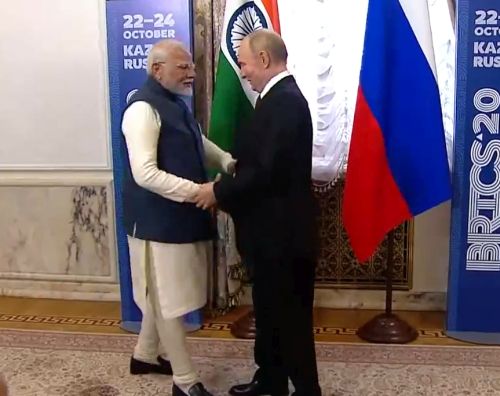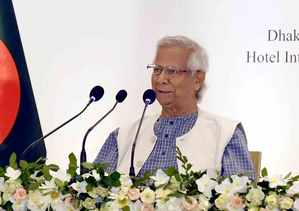International
Red roses symbolize Valentine's love, but vulnerable to climate change: Report
New Delhi, Feb 14 (IANS) The traditional gift of roses that lovers exchange on Valentine’s Day may be under threat, according to a new report from Christian Aid which shows how climate change is impacting rose-growing in the UK and around the world.
Nearly 60 per cent of all exported roses come from five countries in the global south which face growing dangers from extreme weather. Three in East Africa — Kenya (19.1 per cent), Ethiopia (5.1 per cent) and Uganda (1 per cent); and two in South America — Ecuador (21.2 per cent) and Colombia (12.4 per cent).
The report highlights that East Africa already faces erratic temperatures and extended droughts, and extreme temperatures are expected to get both hotter and more frequent — something that could make rose growing highly challenging.
Roses also need plenty of water. The report cites a study which showed that droughts in the area between 2020 and 2022 were found to have been more than 100 times more likely and more severe because of climate change.
Similar climactic dangers threaten the rose-growing regions of South America. In Ecuador and Colombia, roses tend to be grown in high-altitude Paramo ecosystems, with cooler temperatures and good rainfall.
As the climate changes, temperature increases are expected to be highest in the Andean regions, including the Paramo, and extreme temperatures (number of days above 35 degrees Celsius) are projected to rise significantly.
Glacier retreat is also a major issue in the tropical Andes, with at least 30 per cent of their area lost between 1990 and 2020. This risks water scarcity which poses a major threat to a water-intensive industry, like rose growing.
The English Rose is under threat too.
The British love of roses is well known and the UK is the fourth largest importer of roses in the world. However, climate change also poses a threat to those grown at home.
On average, rose plants in the UK now start to flower about a month earlier than would have been seen as recently as the mid-1980s, due to increased average temperatures across January to April.
Increased rainfall is also a problem because of fungal diseases such as rose black spot and powdery mildew which thrive in warmer, wetter springs. Many popular varieties of rose have disappeared because of black spot disease.
David Austin’s award-winning Shropshire Lad is already being withdrawn from sale, as they lack resilience to pests, such as aphids, and diseases which are evolving with the changing climate conditions.
The report warns that without government action to cut emissions and provide financial support to rose growers and others having to adapt to the climate crisis, millions of livelihoods will be at risk.
Horticulturists, florists and climate experts have expressed concerns about the findings in the report.
Charles Shi, Botanical Horticulturist at Kew Gardens, said: “Climate change has significant impacts on rose cultivation around the world. The effects of rising temperatures, changing precipitation patterns, and increased pest and disease pressure can lead to heat stress, reduced flower quality, disrupted flowering seasons, and damage to rose plants.
“Here at the Royal Botanic Gardens, Kew, horticulturists and scientists are working to collect and analyse scents from species roses. This research project will allow us to examine pollinator types associated with these species, and map the change in pollinator populations from different habitats, associated with varying wild rose numbers.
“Research such as this, along with directly addressing climate change where possible, can play a part in preserving suitable regions for rose cultivation, protecting biodiversity and pollinators, promoting sustainable practices in rose production, and safeguarding the economic benefits associated with the industry.”
Osai Ojigho, Director of Policy and Public Campaigns at Christian Aid, said: “Roses are a special part of the Valentine’s Day tradition but with many of them grown in parts of the world vulnerable to climate change, their future is far from rosy. These blooms bring joy, and are a vital income for growers in the global south, yet these livelihoods are endangered by the rising carbon emissions and the seemingly endless pursuit of fossil fuels from rich nations like the UK.
“We need to see far more urgent action from governments to invest in renewables and also commit the needed climate finance to help farmers adapt to a climate crisis they did almost nothing to cause.”
Patrick Mbugua, General Manager, Wildfire Flowers, Kenya said: “I am very concerned about the impact of climate change on rose growing in Kenya. We’ve seen increased disease pressure due to unusual weather patterns, sometimes we have excessive hot weather which sees a jump in the number of pests, and other times unusually low temperatures which increases fungal infections, reducing yields.
“Another example is availability of water for irrigation. While this has not yet affected us since our source of water from Lake Naivasha has been very stable the last 10 years, it is a concern that with climate change such a source could be threatened.
“It is paramount for governments to have clear policy regarding reducing emissions and developing other interventions that can help with climate change. Governments must especially safeguard local economies and social wellbeing from the impacts of emissions.”
Mohamed Adow, Director of Nairobi-based climate and energy think tank, Power Shift Africa, said: “Roses are a major part of the Kenyan economy, with more than half a million people relying on them for their livelihoods. The erratic climate, the extreme temperatures and drought that harm rose cultivation, is what scientists have been warning about for years. The inaction of political leaders to reduce carbon emissions has put an important industry in jeopardy.”
–IANS
vg/sha
International
Lee Hsien Yang seeks refuge in United Kingdom

Lee Hsien Yang, the youngest son of Singapore’s founding father, the late Lee Kuan Yew, announced on Tuesday that he is now a political refugee in the United Kingdom after seeking asylum from the British government “as a last resort.”
“I remain a Singapore citizen and hope that someday it will be safe to return home,” Lee stated in a Facebook post, as reported by Channel News Asia (CNA).
Citing what he described as the Singapore government’s “attacks” against him, Lee, who is the younger brother of former Prime Minister Lee Hsien Loong, revealed that he sought asylum protection in 2022.
Lee Hsien Yang and his late sister, Lee Wei Ling, who passed away earlier this month, have been in conflict with their brother Lee Hsien Loong over the fate of their father’s home following his death in 2015, resulting in a public dispute that has estranged the siblings.
In an interview with the UK-based newspaper The Guardian, Lee alleged that a “campaign of persecution” compelled him to seek asylum in Britain.
In response to his claims, the Singapore government stated that there is “no basis” for his allegations of “a campaign of persecution” or other assertions regarding political repression in the country.
“Singapore’s judiciary is impartial and makes decisions independently. This is why Singaporeans have a high level of trust in the judiciary,” a government spokesperson remarked.
The spokesperson added that there are no legal restrictions preventing Lee and his wife, lawyer Lee Suet Fern, from returning to Singapore. “They are and have always been free to return to Singapore,” the spokesperson said.
Lee and his wife have been outside of Singapore since 2022, having opted not to attend a scheduled police interview regarding potential offenses related to providing false evidence in judicial proceedings concerning their father’s will and the family home.
Lee and his late sister, who had been living at the property, alleged they felt threatened while trying to fulfill their father’s wish to demolish the house. They also accused their elder brother, former Prime Minister Lee Hsien Loong, of abusing his governmental influence to advance his personal agenda.
International
Indo-Russian ties are stronger than ever before at BRICS

Kazan, Russia: Prime Minister Narendra Modi held a bilateral meeting with Russian President Vladimir Putin on the sidelines of the 16th BRICS Summit.
During the meeting, President Putin remarked, “I recall our meeting in July, where we had productive discussions on various issues. We’ve also spoken over the phone several times. I am very grateful you accepted the invitation to come to Kazan. Today, we will attend the BRICS Summit’s opening ceremony, followed by dinner.”
PM Modi responded by expressing his appreciation, saying, “I sincerely thank you for your friendship, warm welcome, and hospitality. It’s a great pleasure to visit such a beautiful city as Kazan for the BRICS Summit. India shares deep historical ties with this city, and the opening of our new embassy here will further strengthen these connections.”
International
Laos seeks to enhance nutrition amid climate change concerns

Vientiane (Laos), Aug 22 (IANS) Representatives from the Lao government and development partners have attended a conference here titled “Climate Change and Nutrition in Laos: Intersections and Interventions” to discuss the impact of climate change on nutrition in the Southeast Asia country and potential solutions.
Speaking at the conference, deputy director general of the Department of Hygiene and Health Promotion under the Lao Ministry of Health Viengkhan Phixay, said, “We gather to address a critical and interwoven issue: the impact of climate change on nutrition and how we can work together to tackle these challenges,” Xinhua news agency reported.
The Lao government is actively engaged in this endeavor, with numerous policies and initiatives aimed at addressing both climate change and nutrition, Lao National Television reported on Thursday.
“By leveraging the Scaling Up Nutrition network in Laos, which is led by the government, and supported by civil society, donors, and the United Nations, we have a robust platform to tackle the negative impacts of climate change while improving nutrition and overall health for everyone in Laos,” Viengkham said at the conference held on Monday.
The conference featured a series of presentations that not only detailed evidence-based research but also introduced innovative tools for measuring and enhancing nutrition under the impact of climate change.
The conference stressed the critical need for integrated approaches to tackle the intertwined challenges of climate change and nutrition, and setting the stage for impactful future collaborations.
–IANS
int/psd
International
One killed, seven injured in shootout in Iraq

Baghdad, Aug 22 (IANS) A civilian was killed while seven others were injured on Thursday in a tribal shootout in Iraq’s holy Shiite province of Najaf, according to a local security source.
The shootout erupted in the early hours between armed men from the local tribe in the al-Zarga area in northern Najaf, some 160 km south of Baghdad, a local police officer told Xinhua on condition of anonymity.
The clash resulted in the killing of an Iraqi civilian and the injury of seven others, including three Iranian Shiite pilgrims, the source added.
A joint force from the Interior Ministry’s emergency response division and Najaf provincial police arrested 53 gunmen from both sides of the shootout and seized weapons and ammunition, the Interior Ministry said in a statement.
It added that search operations are ongoing to locate additional gunmen and weapons, with more details to be released later.
The incident took place as numerous pilgrims traveled to the city of Karbala to observe Arbaeen, which marks the end of a 40-day mourning period for the killing of Imam Hussein, the grandson of Prophet Muhammad, in the Battle of Karbala in 680 A.D.
Typically, these pilgrims also visit Najaf as part of their journey to Karbala.
–IANS
int/jk/arm
International
Bangladesh seeks $1 billion budget support from World Bank

Dhaka, Aug 22 (IANS) Bangladesh’s interim government has sought $1 billion from the World Bank as budgetary support.
The call came from the country’s Power, Energy and Mineral Resources Adviser Muhammad Fouzul Kabir Khan’s meeting with Abdoulaye Seck, the World Bank’s Country Director for Bangladesh and Bhutan, in Dhaka on Wednesday.
He made the plea as the ministry owes more than 2 billion dollars to suppliers in import costs of power and energy, Xinhua news agency reported.
Khan mentioned that the interim government, which was formed with many pressing mandates, is due to settle a $2 billion debt left by the previous government in the power sector.
He said they have already suspended activities under the much-criticized Quick Enhancement of Electricity and Energy Supply Act 2010 and abolished the government’s power to set energy prices without any public hearing.
On August 5, the former Prime Minister of Bangladesh, Sheikh Hasina, was ousted from her country and power, ending her rule since January 2009.
This event was seen as a massive escalation, with what initially started as student’s protests and resulted in a major crisis in Bangladesh.
Earlier on August 8, Nobel laureate Muhammad Yunus took oath as the head of Bangladesh’s interim government.
–IANS
int/jk/as
-
Video2 years ago
PM Modi Attacks Congress in Karnataka with “Kerala Story”
-
Politics2 years ago
Siddaramaiah & DK Shivakumar sworn in as Chief Minister & Deputy CM respectively
-
Cricket2 years ago
CSK players rejoice 5th IPL title with their families (Pics)
-
Entertainment2 years ago
Karan Deol weds his longtime Girlfriend Drisha Acharya (Pics)
-
Sports7 years ago
History Of Official FIFA WORLD CUP Match balls
-
India2 years ago
Ashwini Vaishnaw: Railway Board recommends CBI probe in the Odisha railway disaster
-
Entertainment2 years ago
Urvashi Rautela dazzles on Cannes 2023 red carpet (Pics)
-
Entertainment2 years ago
Sunny Leone gets ready for Kennedy premiere in Cannes (Pics)






























